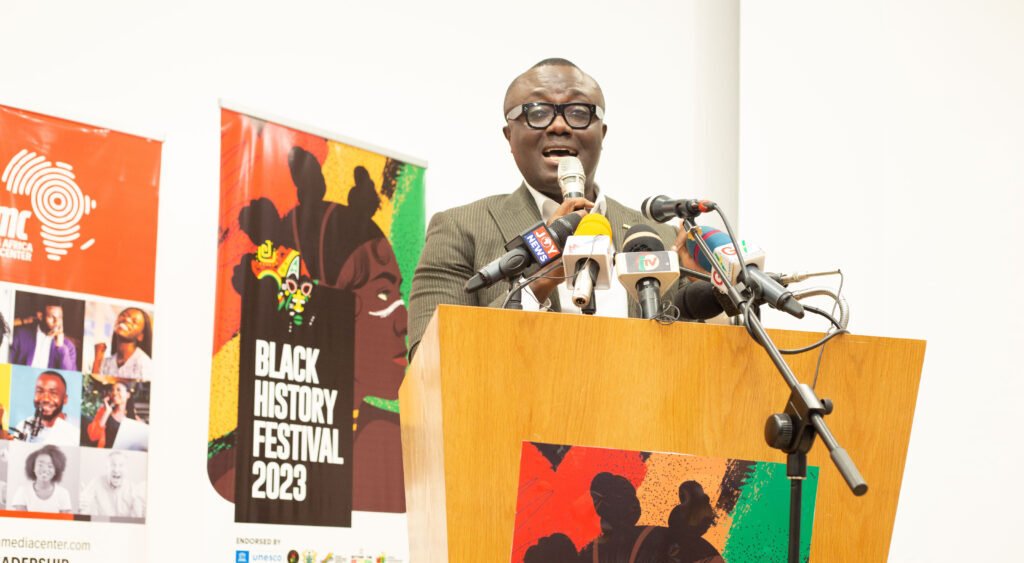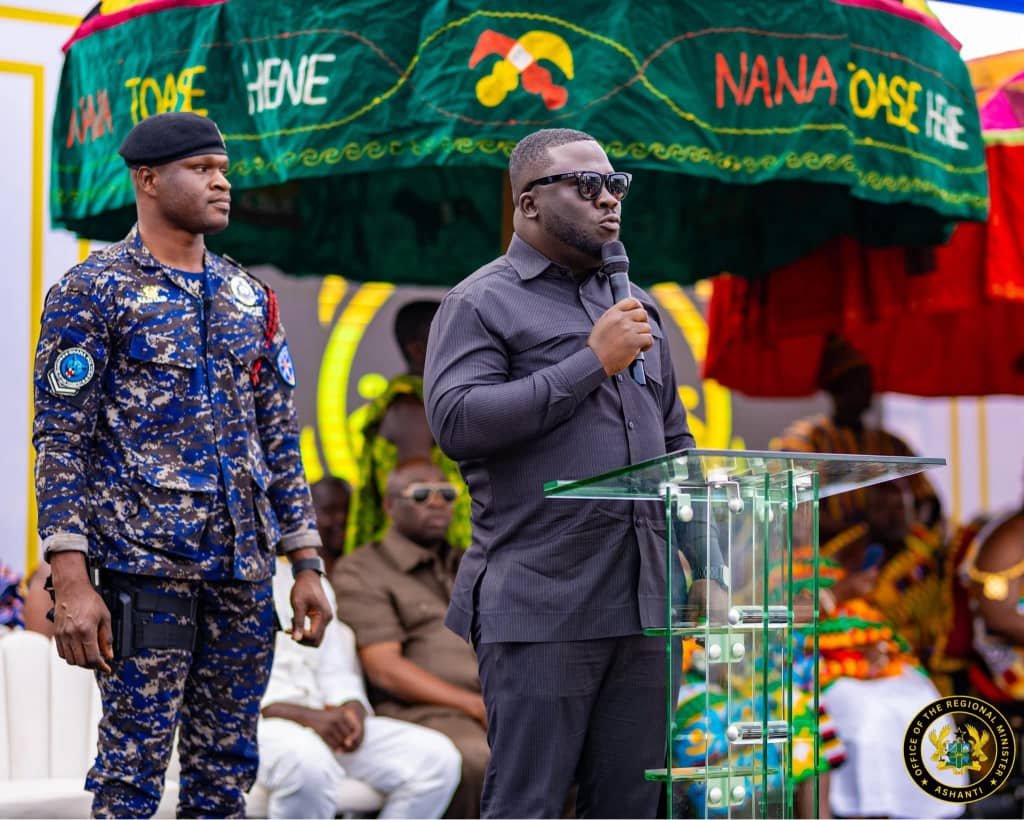News
Bola Ray pledges GHC1m airtime sponsorship for Black History Festival 2023

The CEO of the EIB Network, Mr. Nathaniel Kwabena Adisi, popularly known as Bola Ray has pledged a GHC1 million airtime sponsorship for the 2nd edition of Black History Festival.
At the launch at the Africa Trade House in Accra on 16th December 2022, the Media Icon who was inspired by the initiative mentioned that, he is ready to support the Black History Festival with his outfit and also connect the organizers with a rich Ghanaian in Columbus Ohio for sponsorship.
He also admonished the Ministry of Tourism to pay attention to projecting creatives from Ghana to the world.
Bola Ray believes Ghana has a lot of creative potentials that the country can put the spotlight on to generate some revenue. ‘’Ghana has a bank of creative ideas that can be refined and projected for revenue for the country, therefore, I’m calling on the Ministry of Tourism and all stakeholders in the creative industry to find a way to create an enabling environment to intentionally market what we have to the diaspora.’’
Speaking at the launch, he said, many talents have gone waste in the country, the reason being that most of these young talents do not have what it takes to lift themselves there. He added that the ministry responsible for Tourism and Creative Arts must be intentional in organizing events with excellence around the world which would feature key amongst our top artists alongside young potentials for the spotlight. Deliberate actions of that nature he stated, would put the country and many people on the Global Map.
According to the CEO of EIB, this would afford the nation, a platform to market not just musicians in Ghana but a means to project different shades of our cultural heritage to the diaspora and beyond.
He noted that the Black History Festival is a unique event that would go a long way to bridge the gap between Ghanaians in the country and other Africans in the diaspora, thus strengthening strong ties for effective business partnerships, and exchange of ideas amongst others.
Again he stated that following the success of the maiden edition of the Black History Festival which was held in Washington DC, USA in 2022, he’s optimistic that the Bureau For International Development, Exchanges, and Commerce (BIDEC), organizers of the festival with their partners would make this second edition also a success.
The second edition of BHF would be held in Columbus Ohio, USA from 15th to 18th February 2023.
The Black History Festival is aimed at the celebration of the strong ties between Governments of the United States of America and the African Union member states over the years. It is also an opportunity to celebrate the benefits of the exchange programs between the two bilateral partners.’’
The festival is being organized with support from the African Union Mission to the United States, the Office of the President of Ghana (Diaspora Affairs), and the Office of the Mayor and Accra Metropolitan Assembly (AMA) amongst other key partners to be unveiled.
Source: Ghana/Starrfm.com.gh/103.5FM/ Lambert Donkor
News
God Almighty is incomparable to the Universe – It is an error to reference God as His creation

I have heard people liken God Almighty to the universe. Some have often referred to Him as the universe. It has become a norm in the circular world to reference God Almighty as the universe.
For instance, pop culture has equated or replaced God with the universe, and this has become a normal thing, used in traditional and social media posts. Individual narratives that require the mention of a higher power or authority will usually invoke the universe as that power.
Often, most celebrities from all spheres of life praise the universe for the good things that happen to them and also direct their fear to the universe as paying them back for their bad choices. When things don’t go their way, they wonder if the universe is teaching them a lesson or simply has other plans (Szterszky, 2018).
Even professing Christians at times speak of the universe rewarding or punishing them, or else teaching them a lesson instead of referencing God Almighty. Some pray to the universe instead of God.
Biblically, equating or referencing God to the Universe is an error. God is much higher and bigger than the universe because He created the universe. This article examines some biblical scriptures that highlight this error.
The universe is everything that exist anywhere and forms part of God’s creation. The synonyms for the universe include population, existence, creation, world, cosmos and macrocosm. These are the handiworks of God and should not be equated to God.
On the other hand, God Almighty is the creator, not a creation, he created the world, the cosmos, the terrestrial beings and we cannot trade His glory with that of His creation. It is an error that needs to be corrected (Genesis 1:1-31).
God is the ultimate and eternal creator, while the universe is seen as a vast and finite creation. God is generally considered to be beyond the universe, encompassing it and existing independently, while the universe is viewed as a product of God’s creation and subject to the laws of nature and time.
While God is described as infinite, omnipresent, omnipotent, and eternal, His attributes show that He exists outside of the universe and is not a part of the physical world. God is the creator, sustainer, and ruler of the universe. God is believed to have created the universe from nothing and continues to maintain its existence and order. John 1:1-5).
The universe on the other hand, is viewed as a finite, physical system governed by natural laws. It is seen as a product of God’s creation and subject to the constraints of space and time. Science explores the natural laws and processes that govern the universe. While science explains to some extent how the universe works, it has not been able to address the existence or nature of God.
The following scriptures explain the attributes of God that distinguishes Him from His creation.
The book of Colossians 1:15-20(AMP) says of Jesus, the Incomparable Christ:
15. “He is the exact living image [the essential manifestation] of the unseen God [the visible representation of the invisible], the firstborn [the preeminent one, the sovereign, and the originator] of all creation.
16. For by Him all things were created in heaven and on earth, [things] visible and invisible, whether thrones or dominions or rulers or authorities; all things were created and exist through Him [that is, by His activity] and for Him.
17. And He Himself existed and is before all things, and in Him all things hold together. [His is the controlling, cohesive force of the universe.] [Proverbs 8:22-31]
18. He is also the head [the life-source and leader] of the body, the church; and He is the beginning, the firstborn from the dead, so that He Himself will occupy the first place [He will stand supreme and be preeminent] in everything. [1 Corinthians 15:20]
19. For it pleased the Father for all the fullness [of deity—the sum total of His essence, all His perfection, powers, and attributes] to dwell [permanently] in Him (the Son),
20. and through [the intervention of] the Son to reconcile all things to Himself, making peace [with believers] through the blood of His cross; through Him, [I say,] whether things on earth or things in heaven.
In the book of Romans 1: 19 – 28 (AMP) it is said:
19 For that which is known about God is evident to them and made plain in their inner consciousness, because God [Himself] has shown it to them.
20 For ever since the creation of the world His invisible nature and attributes, that is, His eternal power and divinity, have been made intelligible and clearly discernible in and through the things that have been made (His handiworks). So [men] are without excuse [altogether without any defense or justification], [Ps. 19: 1-4.]
21 Because when they knew and recognised Him as God, they did not honor and glorify Him as God or give Him thanks. But instead they became futile and godless in their thinking [with vain imaginings, foolish reasoning, and stupid speculations] and their senseless minds were darkened.
22 Claiming to be wise, they became fools [professing to be smart, they made simpletons of themselves].
23 And by them the glory and majesty and excellence of the immortal God were exchanged for and represented by images, resembling mortal man and birds and beasts and reptiles.
24 Therefore, God gave them up in the lusts of their [own] hearts to sexual impurity, to the dishonoring of their bodies among themselves [abandoning them to the degrading power of sin],
25 Because they exchanged the truth of God for a lie and worshiped and served the creature rather than the Creator, Who is blessed forever! Amen (so be it). [Jer. 2:11.]
26 For this reason God gave them over and abandoned them to vile affections and degrading passions. For their women exchanged their natural function for an unnatural and abnormal one,
27 And the men also turned from natural relations with women and were set ablaze (burning out, consumed) with lust for one another–men committing shameful acts with men and suffering in their own bodies and personalities the inevitable consequences and penalty of their wrong-doing and going astray, which was [their] fitting retribution.
28 And so, since they did not see fit to acknowledge God or approve of Him or consider Him worth the knowing, God gave them over to a base and condemned mind to do things not proper or decent but loathsome,
We cannot trade the glory of God with that of His creation. If you must give glory to God, do so and don’t equate it to the universe. The universe by itself cannot do anything for you. It is under the control of the Supreme Being, God Almighty who created it and controls it. God will not trade His glory for anything because He is All in All.
Recognise God and His divinity, deity and authority and give Him the honour due Him. It is either God to whom you give honour or something else. When you are tempted to equate good things, remember it should be to God Almighty and not to the universe. May God give us all understanding of who He is and that we know Him for ourselves.
End.
Rev. Dr R. Esi Asante is an Assistant Pastor at the Upcity Church International in Accra. She is also a lecturer with the Faculty of Management at the University of Professional Studies, Accra.
By Rev. Dr R. Esi Asante (PhD)
News
Ashanti Regional REGSEC bans use of motorbikes after 7pm until further notice

The Ashanti Regional Co-ordinating Council has expressed its deep sorrow over the death of Alhaji Abdul-Malik Azenbge, the Chief of Kusaase, who was shot and killed at Asewase on Tuesday, 22nd July 2025.
In reaction to this tragic incident, the Ashanti Regional Security Council (REGSEC) held an emergency meeting on Wednesday, 24th July 2025 to assess the situation and take immediate action to maintain peace in the region.
After the meeting, REGSEC announced that motorbikes would no longer be allowed on the roads after 7:00pm until further notice.
In a press release signed by the Ashanti regional Minister, Hon. Dr. Frank Amoakohene made it clear that the use of unlicensed motorbikes or those without lights was strictly prohibited.
Additionally, they ordered an immediate suspension of the inter-tribal football competition that was ongoing in the region.
Another measure announced was a temporary ban on motorbike riders wearing smocks. According to REGSEC, some individuals have been using smocks to hide weapons, and this posed a serious security threat.
To ensure public safety and prevent further violence, REGSEC said there would be a strong security presence in identified hotspot areas.
It indicated that both police officers and military personnel would be deployed to help protect lives and property.
The Council assured the public of the government’s firm commitment to maintaining law and order.
They noted that everything was being done to find and arrest those responsible for the killing of the chief.
They called on the general public to cooperate with security agencies and share any credible information that could help with investigations. REGSEC emphasized that they remain fully committed to their mandate of keeping the region safe and peaceful.
By Jacob Aggrey






